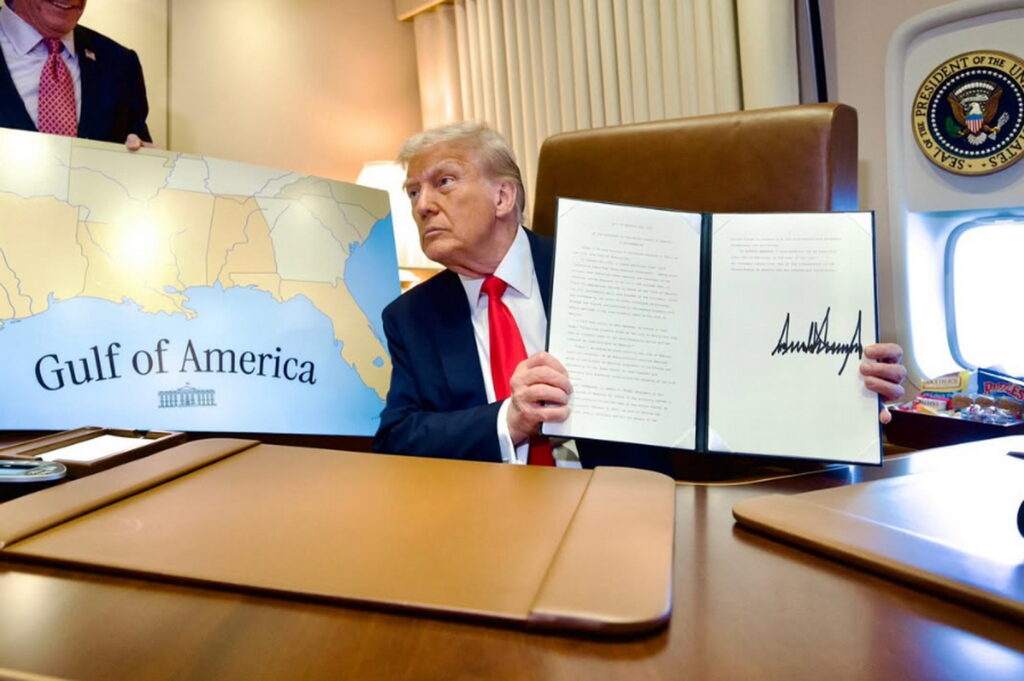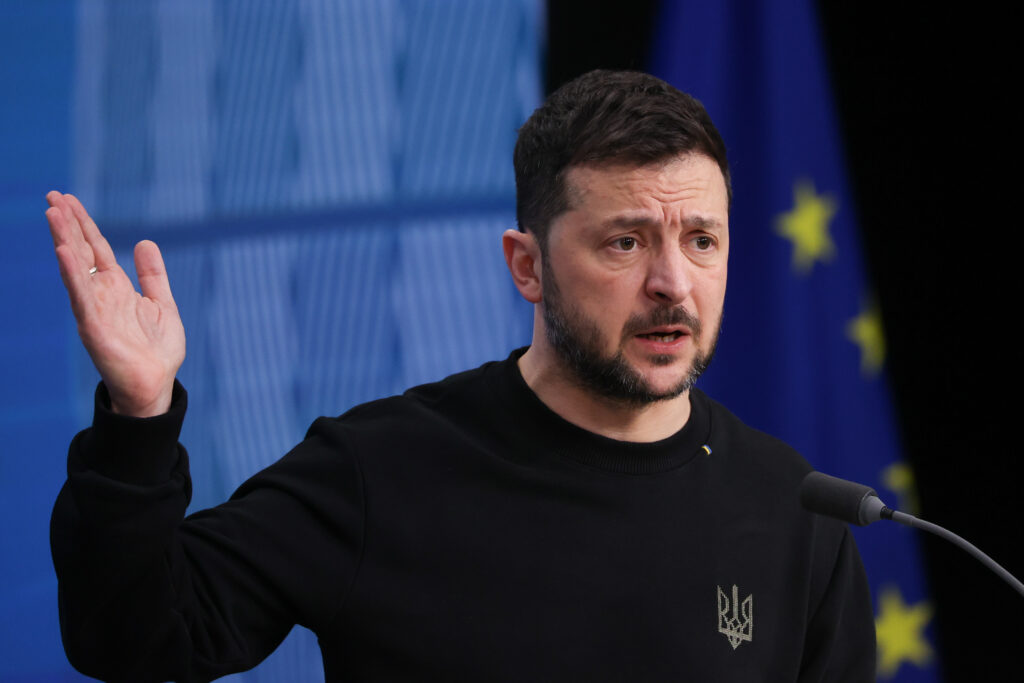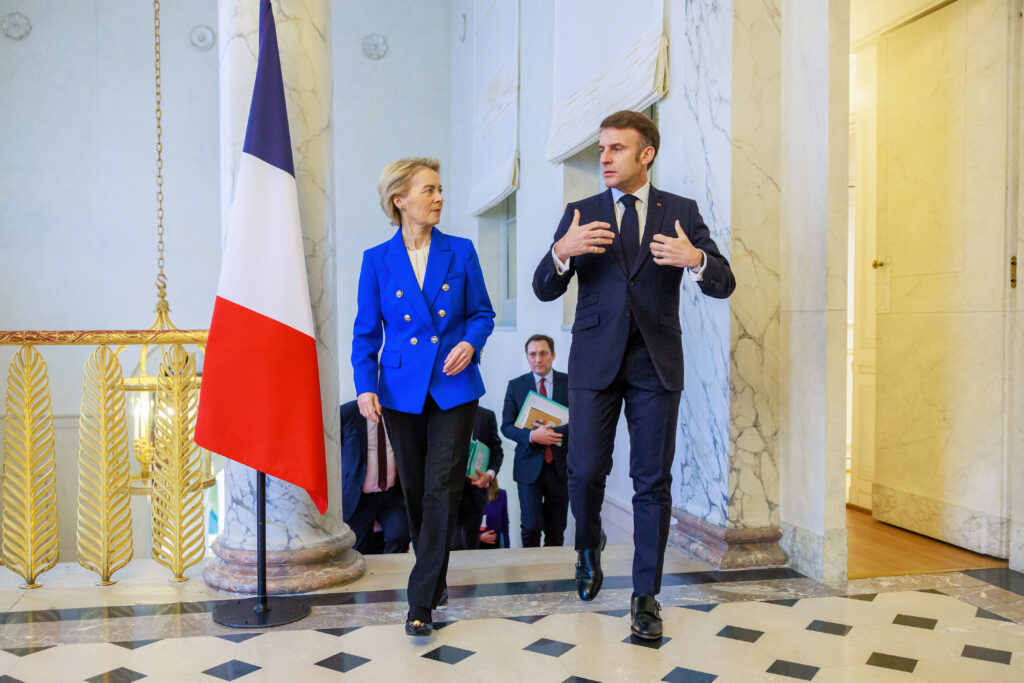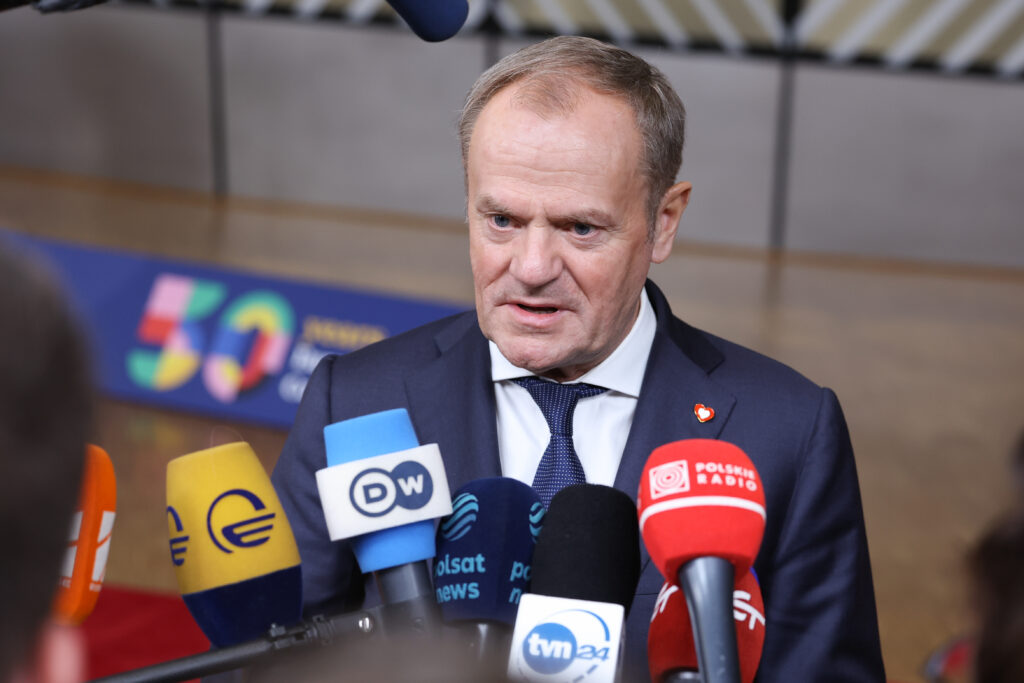Brussels – Emmanuel Macron continues to remind the leaders of the Twenty-Seven of the need to build European strategic autonomy. The return of Donald Trump to the White House, he says, is like an “electroshock” for the Old Continent, which needs to shake off its torpor and take charge of its destiny, starting with the situation in Ukraine. However, among the main obstacles to the vision of the politically weakened French president at home and in Brussels are the rigid spending rules of the EU.
Cold shower
All clouds have a silver lining, in a nutshell, is the gist of a long, all-round interview given by French President Emmanuel Macron to the Financial Times and published this morning (Feb. 14). Since taking office for the second time on Jan. 20, his US counterpart Donald Trump has already made it abundantly clear to the world – but especially to those who theoretically are his closest allies, namely Europeans – that the music has changed dramatically compared to the four years when Joe Biden was in charge in the White House.
It is a full-blown cold shower — a freezing one. On the one hand, the tariff war, for which the EU has not yet finalized a response. On the other hand, there is the other real battle underway in Europe, on the doorstep of the Union, for almost three years now. That is, since Vladimir Putin brought it back to us with the massive invasion of Ukraine on Feb. 24, 2022, in the second act of an aggression that started in 2014 between Crimea and Donbas, not to mention the other bloody war just a little further away, in that battered Gaza where the tycoon would like to build the Mediterranean Las Vegas after the forced deportation of over 2 million Palestinians (a scenario that Macron sees as “extremely dangerous”).

In the middle, there is everything else. From liquefied gas (which Washington is asking Brussels to buy in much larger quantities) to artificial intelligence, a global race in which the Old Continent can only see the backs of China and the US with binoculars while the two superpowers sprint ahead.
“Strategic Awakening”
For Macron, the one unleashed by Trump is a barrage of slaps in the face that should serve to abruptly wake up Europe from the self-induced sleep into which it has been over the past 30 years, remaining in a state of “strategic dependence.” More than a dream, it is an illusion of continuing to ride the gravy train, delegating its defense to Washington, relying on Moscow for cheap energy supplies, and on Beijing as a global market.
But one can wake up when asleep. The US president’s outbursts are a symptom of the condition of “extreme strategic uncertainty” in which the world finds itself, according to the Elysée Palace tenant. “It is an electroshock,” he argues, “an exogenous shock for Europeans.” The only solution, he says, is a radical rethinking of the role and functioning of the EU.
According to him, Europe’s “strategic awakening” can only come from a series of ambitious actions, concerted between Brussels and state governments, which necessarily go toward greater integration: strengthening defense capabilities, relaunching growth, and simplifying the regulatory framework that strangles productive sectors. Without convinced pushes in these areas, he warns, the EU will not be able to reap the benefits of its size. The magic word is “scale:” we need to think in continental terms, no longer national ones, which is what two former Italian prime ministers, Enrico Letta and Mario Draghi, have already stated in their respective reports.
Ukraine’s security
The first and most immediate test for the 27 member states, Macron reasons, is Ukraine. After the Trump-imposed acceleration with the phone call to Putin the day before yesterday, peace (whatever form it may take) suddenly seems within reach. That move opened “a window of opportunity” to bring everyone back to the table: Washington’s role at this stage, he says, is “to restart the dialogue” with Moscow and, therefore, the initiative taken by the White House cannot be condemned.

However, the French leader warns that only Volodymyr Zelensky can negotiate for his country. Allowing reaching a “peace that is a capitulation” would not be in anyone’s interest, least of all that of the United States. The only question, therefore, remains whether Putin “is truly, durably, and credibly willing to accept a ceasefire on this basis.”
Putting the pieces back together after the end of hostilities will be “the” challenge for the EU, which will play a present and future role in post-conflict management, at least in the short term. “The security of Ukraine is the security of Europe,” the Commission spokespeople said. But if Brussels continues to remain passive, it will be the global powers again to redraw (again) the security architecture of the Old Continent, as in the days of the Cold War.
Macron agrees with the US administration on the need for the EU to take responsibility for ensuring the security of the former Soviet republic after the truce. “Trump is saying to Europe: ‘It’s up to you to carry the burden,’ and I say, it’s up to us to assume it,” he argues. He has already initiated discussions with other European chancelleries (starting with Warsaw) on the possibility of deploying a peacekeeping force along the new border in Ukraine. Given that US soldiers would not be part of it (Defense Secretary Pete Hegseth has been clear on this), assuming a 150,000-200,000-strong force (as Zelensky hoped) is “far-fetched.” Still, sending a European contingent (outside the NATO umbrella) to the field will be necessary.
Common Defense
The broader goal, for Macron, must be to build a common European defense so that it can intervene “even when the United States is not involved.” While a joint military force is more like a chimera than an option truly on the table, according to Monsieur le Président, it is crucial to focus on developing “a fully integrated European defense industrial and technological base.”
Although munitions and missile production capacity has increased over the past three years, over-fragmentation remains. Member states are still tied to their own national defense companies, making it difficult for joint development programs and cross-border mergers to take off, from which the infamous “European industrial champions” that Macron has championed since he landed at the Elysee in 2017 could emerge.

To begin with, he says, we need to buy European. Not only because he assures the (Franco-Italian) Samp-T is “better” than the US-made Patriot, but because “if all we do is become even bigger customers of the US, in 20 years we still won’t have solved the issue” of strategic autonomy.
A giant with feet of clay?
There is, however, one big “though” hovering over the French president’s grandiose plans. Translating them into practice requires powerful political momentum, even in the best of economic times (spoiler: today’s is one of the worst in decades). However, Macron seems to have almost run out of political capital.
In Paris, his power, which had seemed almost absolute in his first term, is now greatly diminished, with his liberal center squeezed from both the left and the right. It is reflected in Brussels, where the historic Franco-German engine has been stalled for some time and where the rising stars are emerging from the east — Poland to the Baltics. These countries do not share the same delusions of continental grandeur and are instead much more tied (critics say subordinate) to Uncle Sam.
In addition, there is a problem squeezing all governments in (almost) equal measure. The rigidity of EU spending constraints, set in the recently reformed Stability and Growth Pact (SGP), does not allow member states to invest in the defense sector the amounts needed for a real change of pace. The fiscal and monetary framework the EU gave itself in the 1990s is “obsolete,” Macron stressed, saying it is necessary to develop “innovative financing solutions.”

There is still no talk of Eurobonds and common debt. However, after Berlin gave in to the possibility to explore “greater flexibility” by staying within the SGP, Commission President Ursula von der Leyen proposed just this morning at the Munich Security Conference to recur to the safeguard clause for defense investments (as the Italian government has long evoked as well).
Finally, there is the question of regulation. European regulation is suffocating, the Elysee tenant complains. It needs to be revised to allow innovation and competitiveness. Here, he agrees with the EU executive, which recently unveiled the Compass on competitiveness. “Drastic simplification is needed,” he notes, limiting “crazy” obligations on businesses to jumpstart investment and inject new life into the single market.
A book of dreams that, however, is likely to remain a dead letter, given the financial oaths of almost all member states and the assertiveness shown by Trump since the beginning of his second term. After all, Polish Prime Minister Donald Tusk and the Atlantic Alliance Secretary General Mark Rutte already argued publicly that Europe must buy more American products, starting with weapons.
English version by the Translation Service of Withub







